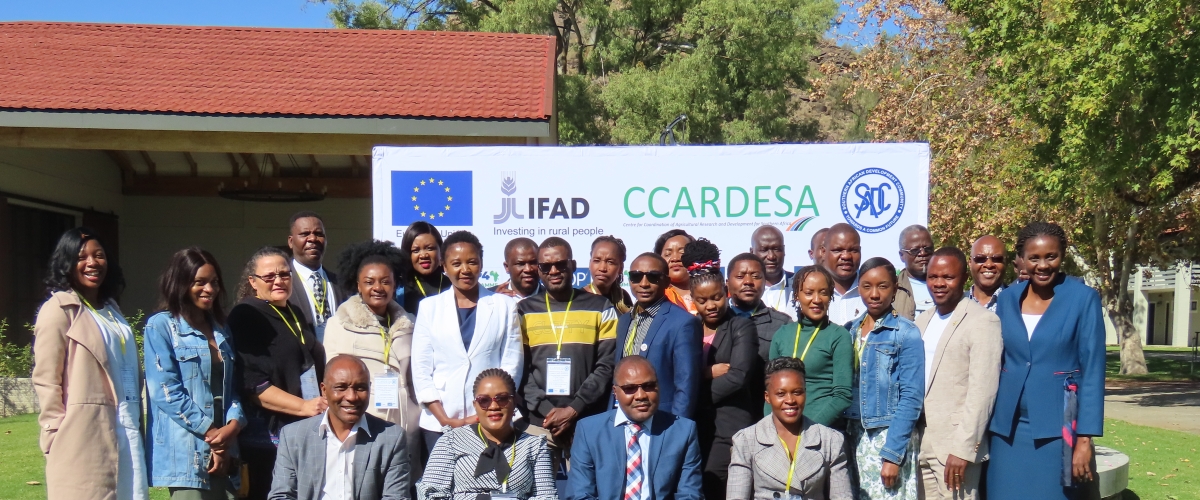
In 2003, under the auspices of the Comprehensive Africa Agricultural Development Programme (CAADP), African governments pledged to grow the agricultural sector by 6% annually and allocate at least 10% of public expenditures to the agricultural sector. The commitments were reaffirmed in 2014 through the Malabo Declaration.
In the quest to meet the commitments, the Centre for Coordination of Agricultural Research and Development for Southern Africa (CCARDESA), in conjunction with the Namibia Ministry of Agriculture, Water and Land Reform (MAWLR) and the Forum for Agricultural Research in Africa (FARA), convened a landmark national workshop on Knowledge Management and Malabo Commitments Reporting and Monitoring at Midgard Lodge in Okahandja-Namibia. The workshop aimed to share knowledge management principles critical for implementing the Malabo Commitments under the Comprehensive Africa Agricultural Development Programme- Ex Pillar 4 (CAADP-XP4). The CAADP-XP4 Programme is implemented in collaboration with the African Forum for Agricultural Advisory Services (AFAAS), Association for Strengthening Agricultural Research in East and Central Africa (ASARECA), West and Central African Council for Agricultural Research and Development (CORAF) and Forum for Agricultural Research in Africa (FARA). It is funded by the European Union (EU) and implemented by the International Fund for Agriculture Development (IFAD)
Mr Rudolf Nanuseb, Valuer General at the Ministry of Water, Land and Rural Development, officially opened the training workshop. Speaking on behalf of Executive Director Ms Ndiyakupi Nghituwamata, Mr Nanuseb noted that Namibia is committed to achieving the Malabo targets by putting viable systems under knowledge management to capture the relevant data. He further thanked CCARDESA for the overwhelming support that she continues to provide for Namibia.
The meeting also highlighted the fluctuating progress in implementing the Malabo commitments. As Mr Petrus Uushona, the Chief Development Planner, revealed that Namibia was once on track to implementing the Malabo in 2017. However, they were not on track in 2019 and 2021.
International Consultant on the Malabo, Mr Martin Muchero, exposed the participants to the CAADP result framework, an overview of the Malabo Declaration Commitments and the indicators. He also shared the technical guidelines for calculating the Malabo indicators.
Ms Futhi Magagula, the CAADP-XP4 Programme Officer for CCARDESA, asserted CCARDESA’s commitment to supporting the countries towards meeting their Malabo targets. She also shared an overview of CCARDESA projects implemented in the SADC Region.
Mr Clemins //Khaiseb, the Acting Director, underscored the importance of the meeting and the necessity of homegrown technologies and solutions for food security.
The workshop also illuminated knowledge management’s vital role in attaining Malabo targets. Reinforcing this sentiment, Mrs Bridget Kakuwa-Kasongamulilo, CCARDESA’s ICKM Officer, stated that organisations that maximise knowledge sharing have a comparative advantage over those that do not. Echoing this, Mr Benjamin Abugri, Forum for Agricultural Research in Africa - FARA's Cluster Lead of Knowledge Management, added that Knowledge is only power when shared. The duo shared their organisation’s knowledge management systems and how critical they are in information transfer.
Ms Mirjam Taapopi, ICKM Focal Point for CCARDESA in Namibia, presented crucial insights on the Knowledge Management strategy and further called for ministry support. Prof. Kingo Mchombu, the Knowledge Management Expert from the International University of Management, further emphasised that communication is the missing link in knowledge management. He urged the ministry to support the strengthening of Knowledge Management as knowledge is now seen as the 4th estate of production.
On the sidelines of the workshop, a Media briefing was held to demonstrate journalists’ critical role in disseminating the Malabo Commitments. The workshop culminated with the presentation of action plans by various representatives.
Mr Ben Haraseb, Acting Director of the Directorate of Agriculture Production Extension and Engineering Services (DAPEES), delivered the closing remarks where he expressed gratitude for developing a good action plan that might lead to Namibia reaching its Malabo targets. He urged the team to continue the discussions as they departed to their respective workstations.
Participants drawn from a diverse array of institutions, including the Ministry of Agriculture, Water and Land Reform (MAWLR), National Planning Commission (NPC), Namibia Statistic Agency (NSA), Food Agriculture Organization (FAO), University of Namibia (UNAM), International University of Management (IUM), Non-Governmental organisations, and Namibia University of Science and Technology (NUST), among others, left the meeting satisfied that all expectations were met, and armed with an actionable plan to continue creating awareness of the Malabo commitments.





